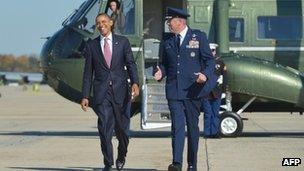Different visions of America's road ahead
- Published
- comments

Has Barack Obama led the world the way he promised?
This debate is about that most critical of subjects - America's power and strength, and how it should act to change the world.
Part of the wave of optimism that President Barack Obama rode to power four years ago was the promise that he would end former President George W Bush's wars, and rebuild America's reputation in the world.
Many Americans may be more immediately concerned with the state of the economy, but there are few subjects quite as important as this.
After George W Bush
It is why there is so much focus on this election in the rest of the world - the two candidates are vying to control the most powerful military machine the world has ever known, a country that has repeatedly influenced the course of history in the last 100 or so years, that still has more diplomatic clout than any other nation.
A BBC opinion poll of nearly 22,000 people in 21 countries suggests the rest of the world hopes Mr Obama stays at the helm. Curiously, the only country where he doesn't come out on top is Pakistan - where most didn't have a preference.
Of course, Mr Obama will stress that he has been tough in America's defence. He'll talk about the killing of Osama Bin Laden, and claim he has kept the US safe.
But not tough enough, according to his opponent. Republican challenger Mitt Romney's central case is that Mr Obama never gives a strong lead and he's repeatedly apologised for the US.
This common charge from the right springs directly from Mr Obama's attempt to undo the works of Mr Bush. He seems to believe that many had come to see the US as a swaggering bully, which said "my way or the highway", even to allies.
Many Americans have very little idea of how the US was seen abroad during the Bush years and for merely understanding this, Mr Obama is suspect to some people.
He has tried to make friends with those who might be hostile, and to create policy alongside allies. Implicit in his approach is that the US may still be the most powerful country in the world, but it is not the only one that matters. To some, that is simply weakness.
There is a debate about how well the Obama doctrine has worked, from Russia to the Muslim world, from Iran to China. There are not many obvious triumphs that spring from his more open-handed approach.
But to some critics, the details are merely a toxic by-product of what they consider the central betrayal. They feel Mr Obama does not agree with them that the US is a country with a unique and almost sacred destiny to lead the world.
Some think that Mr Romney wouldn't be very different to Mr Obama when it came to foreign affairs. But tonight two very different visions will be on offer.